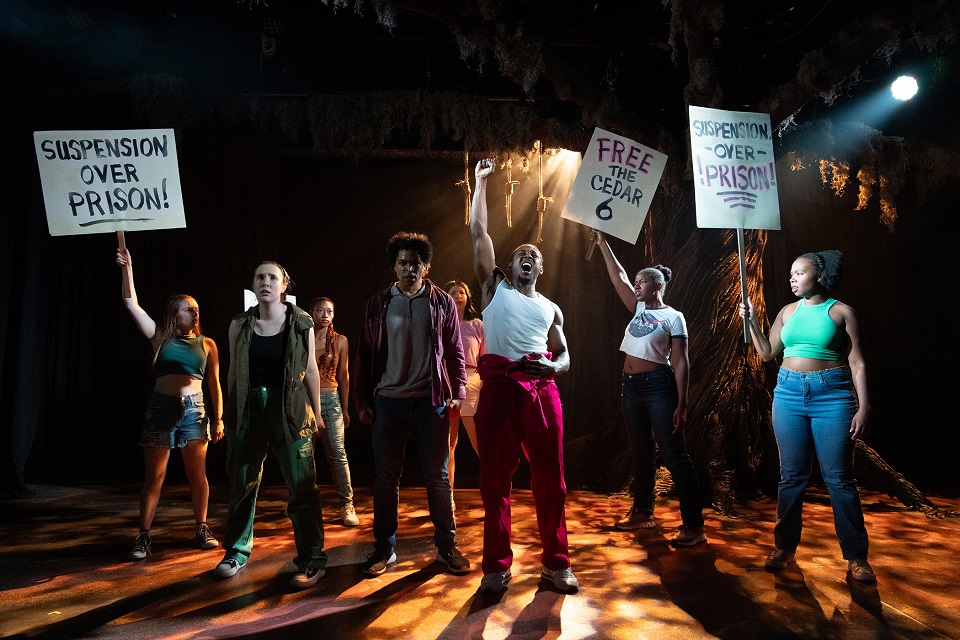
LOS ANGELES — So many fortuitous elements have come together in the Open Fist Theatre Company production of Dominique Morisseau’s Blood at the Root. The right playwright for the subject, a passionate young cast, a stunning set, and a genius director who has taken this “choreopoem” in his hands and made it move and sing. I wouldn’t have missed it for anything.
First, about the playwright. I don’t know, it seems like I’ve been stalking Morisseau for the last few years. Maybe just paying attention. Skeleton Crew was my first exposure to her, a play about the hollowing out of the auto industry (very topical for the striking moment we’re living in now). Next, the versatile playwright took up the exhilarating story of a popular musical group in Ain’t Too Proud: The Life and Times of the Temptations. And then there was Paradise Blue, about gentrification in Detroit. And now Blood at the Root, first performed in 2014 by the National Black Theatre.
“This story is inspired by a series of incidents, media reporting, and social action in Jena, Louisiana, in 2007,” says the playwright. “I dedicate this work to the resilient young men who make up the Jena 6.” The case was widely discussed at the time. More detail can be found in the Wikipedia article. People’s World covered the story assiduously; its article from July 2009 brought readers up to date on the final resolution of the case.

Morisseau bases her taut 78-minute, no-intermission play on the escalating racial tensions between Black and white students at Cedar High, exposing the double standard often applied to racially charged situations.
On a scorching autumn day, Raylynn (Nychelle Hawk), an African-American senior running for class president, dares to break an unspoken tradition by grabbing some shade under Old Devoted, a historic oak tree at the school, an area typically reserved for white students. Other Black students follow her lead. The next day, three nooses are discovered hanging from the tree, sending shockwaves through the school. Legend has it that lynchings had once occurred at this very site.
The school administration dismisses the incident as a thoughtless “prank.” The principal even calls in the assistant district attorney to order the protesters to disperse. In the aftermath, during a subsequent rumble one night provoked by racial and homophobic slurs and “yo mama” jibes, six Black teenagers are accused of beating a white schoolmate. In place of remedial efforts at the school, authorities bring attempted murder charges.
The play’s title comes from Abel Meeropol’s song “Strange Fruit,” written under the pen name of Lewis Allan and often performed by Billie Holiday, whose lyric moans, “Southern trees bear a strange fruit, blood on the leaves and blood at the root.”
A true amalgam of individual talents into a whole pageant with bold, memorable characters in an 11-member cast (rather large for a one-act play), the work explodes with hip-hop music and movement, and colorful idiomatic speech. The multiple award-winning Michael A. Shepperd, making his Open Fist directorial debut, expertly deploys his actors to fill the stage with adolescent adrenaline. “This play feels so relevant for right now because we keep reliving these incidents,” he says. “This is a fantastic ensemble piece that uses rhythm, sound, and poetry to explore friendship, racism, and the miscarriage of justice.”
If the play has a protagonist, that would be the bold Raylynn. But several other characters stand out, representing different points of view, background, experience, and attitude. On the female side, Toria (Grace Soens) is the ambitious aspiring journalist who tries persuading her editor at the school newspaper to allow her to do some deep, necessary investigative reporting instead of the milquetoast articles and tedious announcements he favors. And Asha (Caroline Rose), a white girl raised in a partly Black household, supplies Raylynn with a campaign slogan: “Because It’s Just Time.” Asha believes she is “Black by association” and about as prejudice-free as anyone could be, but turns out to have her blind spots after all: “I never felt so white until all this started.”
Among the three main male characters is DeAndre (Nicholas Heard), Raylynn’s brother and football star, both still missing their mother who died three years earlier. For him, especially, “mama” jokes do not go over well. It is he who will take the most heat from the fight with the white student. Justin (Azeem Vecchio) is the vacillating editor, accused of being an “Oreo” but trying to cool matters down with his uncontroversial style of journalism. The white boy who gets beaten up is Colin (Jeremy Reiter II), new to Jena after being hounded out of his last school under a storm of homophobic taunts. Belying his slight build, he also plays on the football team.

All these co-equal “leads” are complex characters with nuanced, shifting relations. There’s not a stereotype amongst them. The audience will be very slow to level judgment, seeing how there are deep roots to all the problems of today.
As members of the “Chorus,” playing mostly students but occasional other roles as needed, we have Amber Tiara, Malik Bailey, Deandra Bernardo, Emma Bruno, and Jack David Sharpe. A remarkable scene has the whole cast trying to reconstruct what happened that night—a Rashomon-like interrogation of the slippery phenomenon of witnessing.
Shepperd directs his cast with balletic finesse and without polemic. He explores the characters’ inner conflicts as thoroughly as the more visible outer ones. The play is a combustible cauldron of race, homophobia, anger, frustration, hormones, justice, history, language, and blistering heat. He has wrung every truth out of Morisseau’s evocative script.
The Open Fist creative team includes scenic designer Joel Daavid; lighting designer Gavan Wyrick; sound designer Marc Antonio Pritchett; costume designer Mylette Nora; and choreographer Yusuf Nasir.
Although Morisseau based this play on the Jena Six incident, audiences do not have to prepare themselves with knowledge of the historical case. The stage work totally stands on its own. In an interview on stagebuddy.com, she commented about some of the age-old dilemmas facing the playwright:
“I don’t write to exclude anyone. To write about a specific experience is not an exclusionary practice, so I want to state that first. I think the more specifically a writer can write, the better the writing. If I’m writing about young people and their world, I better be specific about high school students and what’s on their minds. If I’m writing about a region, and the region is the key, then I have to make sure I get all the regionalisms right. It doesn’t mean that someone not from that region, age group, or generation should not be able to connect.”

The conclusion uncannily suggests that climate change—global warming—may be playing a role in the human drama. Raylynn speculates that “the whole world is overheated and we’re going to go up in a ball of fire because we can’t do nothing.” Is some kind of final racial/ecological reckoning in store for us? Is there any hope?
Perhaps there is. Toria, the young fighting journalist who stems from an abolitionist family, may have the last word: “If you don’t know how to connect to a struggle that’s not your own, then we’re all lost.”
Blood at the Root runs through October 28 with performances at 8 p.m. every Fri. and Sat. (except Oct. 7); at 7 p.m. every other Sun.; and at 3 p.m. every other Sun. There will be one additional performance on Monday, Oct. 9 at 8 p.m. Atwater Village Theatre is located at 3269 Casitas Ave. in Los Angeles 90039. Parking is free in the ATX (Atwater Crossing) parking lot one block south of the theater. To purchase tickets and for more information call (323) 882-6912 or go to www.openfist.org.
We hope you appreciated this article. At People’s World, we believe news and information should be free and accessible to all, but we need your help. Our journalism is free of corporate influence and paywalls because we are totally reader-supported. Only you, our readers and supporters, make this possible. If you enjoy reading People’s World and the stories we bring you, please support our work by donating or becoming a monthly sustainer today. Thank you!












Comments